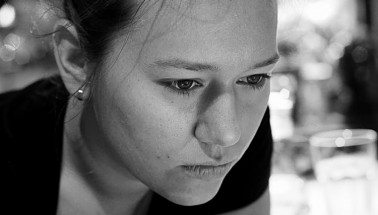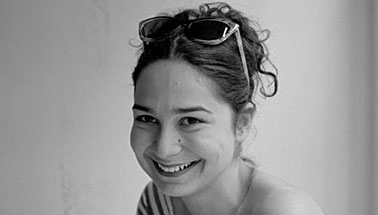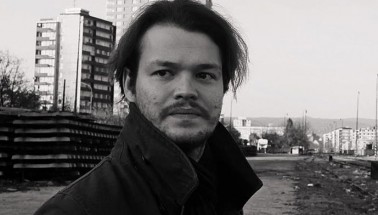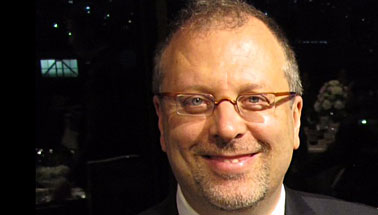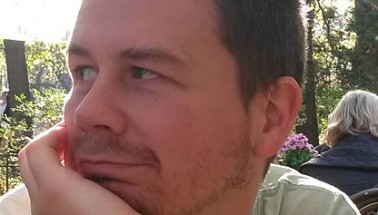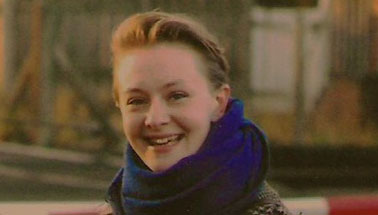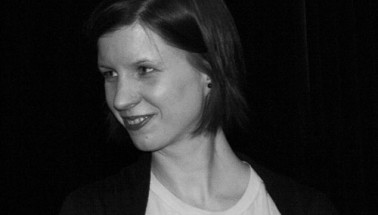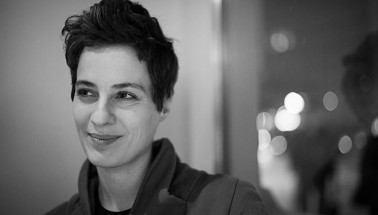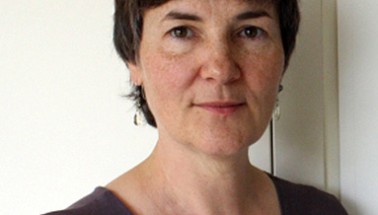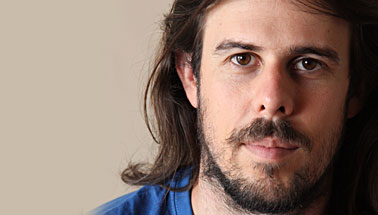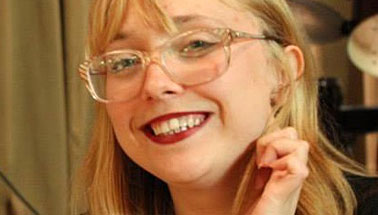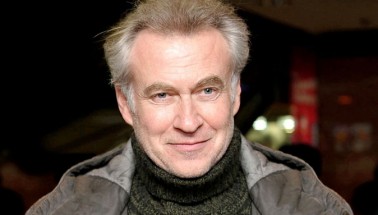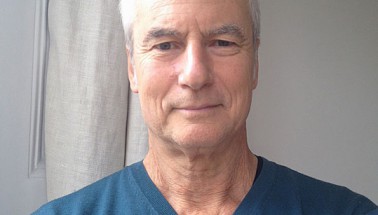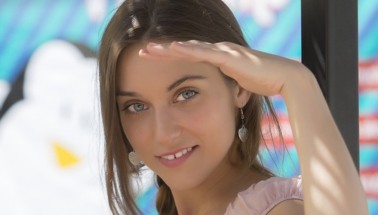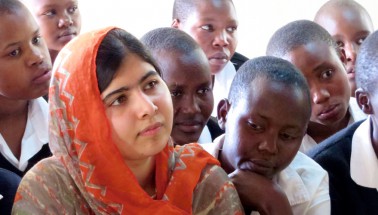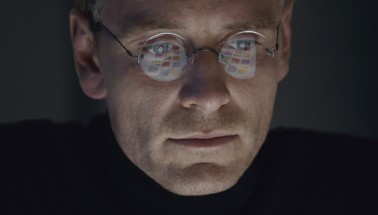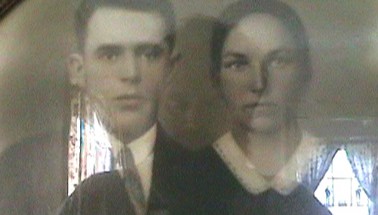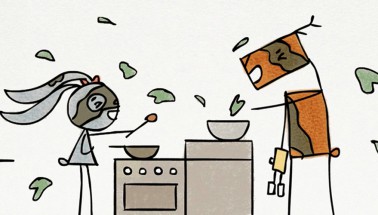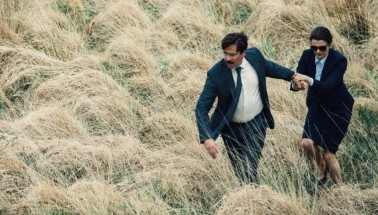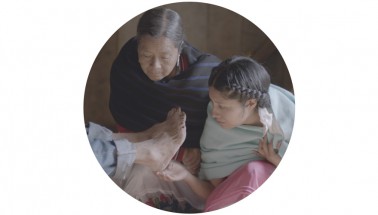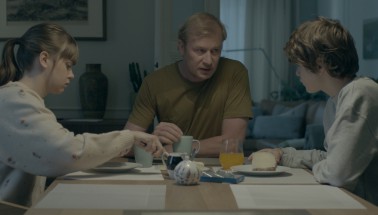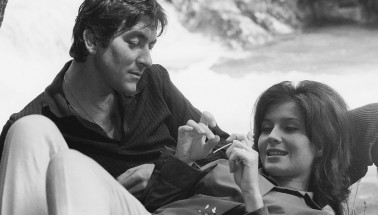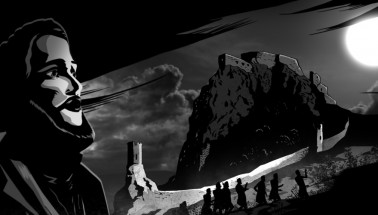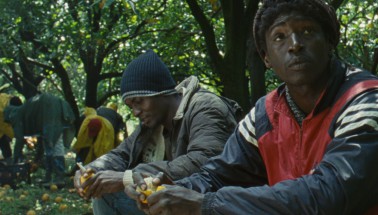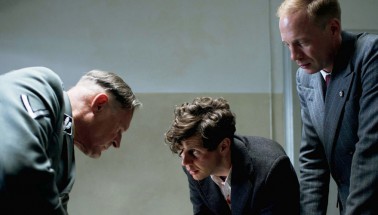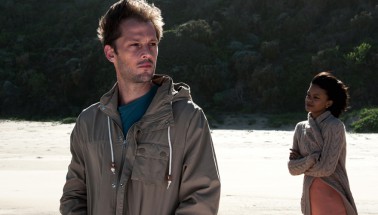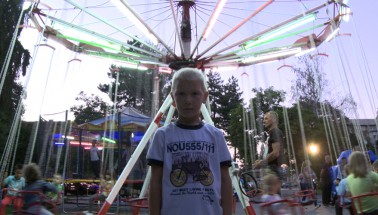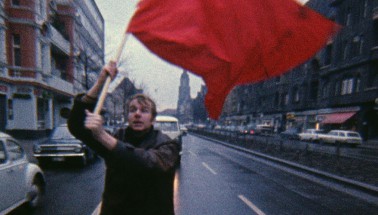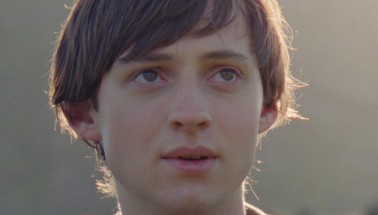Verona Dubišová is in the fourth year of her film studies at the Academy of Performing Arts in Bratislava. For three years she also studied editing and publishing at University of Constantine the Philosopher in Nitra. Along with some of her fellow students, she is currently preoccupied with the Film Cabinet for Children, lecturing pupils of the first stage of primary schools on animated films, and many other interesting activities, for instance the project to build a new school cinema or to prepare a scientific conference under the aegis of her school.
Gabriela Gažová currently pursues her MA degree at the Department Photography and New Media of the Academy of Visual Arts in Bratislava. She earned her bachelor’s degree from the Department of Intermedia and Multimedia where she studied in the Video Atelier led by senior lecturer Anna Daučíková. At the same time, she studies film directing at the Film and Television Faculty of the Academy of Performing Arts in Bratislava and at Sint-Lucas School of Arts in Bussels where she spent the past two semesters. In her works she combines various media and uses multi-genre overlaps the same way she did for three years as the founder and chief editor of an independent art magazine, Tvor.
Róbert became attracted to film journalism during his high school studies. Following his apprentice years as editor of web servers he began to write for the Hospodárske noviny daily and later for the Pravda daily to which he remained faithful until today. Currently he works as part-time editor with Radio Devín as well as In.Ba and Film.sk monthlies. He has collaborated with a number of cultural magazines in Slovakia. He is an active musician, lyricist, music producer and the founder of the Real Music House publishing house. During his career as a musician he has won several prestigious awards. In 2013 the Limerick publishing house released his debut poetry book entitled “Is This Us?” Still, cinema is his lifetime passion and a natural part of everyday life.
A journalist by profession, Luca Pellegrini graduated from the Sapienza University of Rome and earned a degree from the Pontifical Gregorian University. He was a film critic and journalist for Il Corriere del Giorno and L’Osservatore Romano; for more than a decade, he worked for RAI – Radio 3. Currently he writes for the Avvenire daily newspaper, the Rivista Del Cinematografo monthly magazine, the Cinematografo.it website and is part of the Vatican Radio newscast. Besides cinema, he has also been engaged in theatre and opera, working as assistant director. He has provided counselling in communication to major theatres and opera foundations and currently assists some important international music festivals. He is an active member of the National Union of Italian Film Critics and was a member of the selection committee of the International Critics’ Week at the Venice IFF between 2013 and 2015.
Coming from Gateshead, UK, Michael Pattison is a film critic whose writing has appeared in Sight & Sound, Indiewire, VICE, Ekran, KINO!, SIRP, MUBI and other publications. He has tutored workshops for young critics at Warsaw IFF, Dokufest in Prizren, ZubrOFFka Short Film Festival in Białystok and Black Nights Film Festival in Tallinn. Michael has also appeared on juries at film festivals in Cartagena de Indias, Ljubljana, Warsaw, Drama, Thessaloniki, Lisbon, Santiago de Compostela, Lecce, Lima and Bradford.
A freelance film writer and programmer based in Scotland, Harriet Warman holds a Master of Science degree in film studies from the University of Edinburgh. Her writing has appeared in Sight & Sound, Little White Lies, CineVue and the Glasgow-based Physical Impossibility zine. Harriet has worked as programme coordinator for AV Festival, Berwick Film & Media Arts Festival and Edinburgh International Film Festival. She is a stable member of the latter festival’s programme team, having served as a short and feature film viewer since 2012 and a programme advisor for the documentary programme in 2015. She has reported on many festivals including Sheffield Doc/Fest, BFI London Film Festival and International Film Festival Rotterdam; she also writes for and edits the Cinematic Investigations film site. As a freelance programmer, Harriet has curated for the Edinburgh Film Guild and Dundee Contemporary Arts.
Eva Križková graduated from the Film and Television Faculty at the Academy of Performing Arts in Bratislava, majoring in film science. As part of her studies, she completed a research fellowship at Univerzidade de Aveiro in Portugal. In 2012, she began to work on her doctor’s degree at the Institute of Theatre and Film Research of the Slovak Academy of Sciences where she studies distribution of contemporary art films in Slovakia. As a co-founder, PR and project manager of the Filmtopia distribution company, she is also practically involved in distributing films for so-called discriminating viewers. She is a co-founder and editor-in-chief of cinema bi-monthly Kinečko, which provides a platform for an open and erudite debate of Slovakia’s cinema community.
Doris Bauer is the spokeswoman for the Austrian Film Festival Forum and a film curator. She studied political science at the University of Vienna. From 2006 to 2014 she worked as the managing director of Filmgalerie 8½, an independent DVD rental store in Vienna. Between 2008 and 2014, she was the director of espressofilm, an annual open air short film festival held in Vienna’s 8th district. She is the head curator of the international Fiction & Documentary competition at Vienna Independent Shorts. In 2012 she co-founded the Austrian Film Festival Forum.
Lida Suchy is a first-generation American born into a refugee family; she often draws on this background as inspiration for her creative work. She received her MFA from the Yale University School of Art. In recognition of Lida’s creative work, she was named Fulbright Scholar, awarded a Light Work Grant and Artist-in-Residence; a New York State Council on the Arts grant, ArtsLink grant, IREX Fellowship, among others. Lida is co-producer of several documentary films including I Have come a Long Way, About Dogs and People, Pictograph and Prysia’s Garden; for the last two she was also chief photographer. These were screened at film festivals at Oberhausen, Edinburgh, Florence, San Francisco, Krakow, Hamburg, and at Cinéma du Réel Paris, among others. Selected solo or two-person exhibitions include The Photographer’s Gallery, London; Spisske Muzeum, Levoca, Slovakia; The Washington Project for the Arts, Washington, DC; Galerie Grauwert, Hamburg Germany; Castellani Art Museum, Niagara University, Light Work, Syracuse, NY and ArtRage Gallery, Syracuse, NY. Lida’s work is included in public collections at George Eastman House International Museum of Photography and Film; Brooklyn Museum; Bibliothèque Nationale; San Francisco Museum of Modern Art; and Ivan Franko Museum in Kryvorivnya, Ukraine, among others.
Hermes Paralluelo graduated from Centro de Estudis Cinematogràfics de Catalunya, majoring in cinematography, and immediately began working on documentaries for Barcelona Televisión. In 2004 he moved to Argentina where he debuted two years later with a medium-length film, Pan de Azúcar, which was selected for Documenta Madrid and the Valdivia IFF. His feature-length debut, Yatasto (2011), was awarded at numerous film festivals such as Bafici, FidMarseille, Viennale, Ficunam, Málaga, etc. His second feature film, Not All Is Vigil (No todo es vigilia, 2014), premiered at the San Sebastián IFF and was later awarded at film festivals in Bratislava, Palm Springs, Mar del Plata, Uruguay, Cosquín, etc.
Selina Crammond is a programmer of film festivals and a community organizer who lives in Vancouver, Canada. She currently works for DOXA Documentary Film Festival as well as the Vancouver International Film Festival. Selina earned a degree in Communication and Film Studies from Simon Fraser University (SFU) and currently is an associate of SFU’s Institute for Humanities.
Screenwriter and director Zrinko Ogresta is the professor of film directing at the Academy of Dramatic Arts in Zagreb and member of the European Film Academy. Praised for strong visual style, well-articulated mise-en-scène and innovative storytelling, his films focus on the anxieties that lurk behind the characters’ well-cultivated bourgeois facade, using their emotional and psychological fractures to bring to light the complexes that haunt the society in general while shrewdly analysing social and political forces in the background.
Ogresta’s films have been screened and awarded at renowned international and local festivals such as Venice, Karlovy Vary, London, Montpellier, Denver, Milan, Pula, etc. His most notable prizes include the nomination for European Film Award in the category of best young director for the film Fragments (Krhotine, 2011), Prix Italia for the film Washed Out (Isprani, 1995) and Special Jury Prize at the Karlovy Vary IFF for the film Here (Tu, 2003).
Christopher Goodwin has written about film and culture for more than 30 years. He was the editor of the film trade publications, Screen International and Moving Pictures International, and was the international editor of The Hollywood Reporter. He has reported on film and culture for The Sunday Times (of London), The Times, GQ, Esquire and numerous other publications. He was on the feature film juries of the Zagreb Film Festival 2012, the Pula Film Festival 2015 and the Batumi (Georgia) Film Festival 2015.
Judit Bárdos originally began to study piano playing but then switched to acting, which she graduated from at the Academy of Performing Arts in Bratislava in 2013. In the 2014/2015 season she was a regular member of the Jókai Theatre troupe in Komárno; currently she is a freelance actress who gives guest performances in three theatres, namely Slovak National Theatre in Bratislava, Andrej Bagar Theatre in Nitra and Jókai Theatre in Komárno. For rendering the main character Eva in her feature debut, The House (Dom, 2011), she won the Blue Angel award at the Art Film Fest IFF as well as prestigious Igric and The Sun in a Net awards. She was nominated for the Czech Lion award for her role of Anna in Fair Play (2014) and clinched the Best Female Performance award at the Social World Film Festival in Vico Equense for the role of Jewish pianist Edith Kraus in In Silence (V tichu, 2014). In 2014, she also appeared in a fantasy fairy-tale, Love in Your Soul (Láska na vlásku), as well as in the Doctors (Doktori) TV series.
The films by Slovak-American documentarist Mišo Suchý revolve around the issues of family, home, identity, departures and returns. Having graduated from documentary filmmaking at VŠMU in Bratislava, Suchý fell in love with a first-generation American with Ukrainian roots and followed her over the ocean where they built a new home together. Suchý took pleasure in making documentary portraits of his own family even before his departure overseas and has remained faithful to this artistic strategy ever since. While in emigration, his films gradually began to ponder the issues of separation, perceiving and overcoming the distance.
Our retrospective comprising two blocks of short and medium-length films will examine the two principal subject-matters of Suchý’s filmmaking: that of family and that of ethnography. Particularly in the latter one will the festival-goers be able to trace the influence of his former teacher Martin Slivka as well as photographic creation by his wife, Lida Suchá, who cooperated on a number of his films including the most recent one.
Pavel Smejkal
Curator of the section
The section was put together in close cooperation with the traditional Month of Photography exhibition, which will this year include a separate exposition featuring the works of photographer Lida Suchá.
The collection of contemporary animated films for children presents the best of the genre in past several years in an attempt to demonstrate that a short animated film for children may not necessarily be popular-oriented, strictly educational or uselessly garrulous. There are a lot of filmmakers in the world who regularly manage to avoid these notorious shortcomings in their films. Our selection includes pictures that feature some well-thought-out, far-from-obvious humour, which is guaranteed to entertain not only infant viewers but also their adult chaperones. At the same time, it may help festival-goers gain a solid overview of established stars of short animated film as well as young talents of the genre (e.g. Alexandra Hetmerová, Péter Vácz).
Maroš Brojo
Curator of the section and Programme Director of Fest Anča
The section was prepared in cooperation with Fest Anča, Slovakia’s largest international festival of animated films.
The national focus is an increasingly popular format that every year draws festival-goers’ attention to a select national cinema and its thematic, genre and poetic specifics. This year, we chose a country that has been amply discussed in Slovakia over the past several years. In contrast to the country’s bleak political and financial situation endlessly dissected and regurgitated by world media, Greek films have enjoyed the limelight at prestigious film festivals the world around. The cheeky and uncompromising rising stars of New Greek cinema – an attribute that has earned a capital “N” and has made it a phenomenon among some film critics – seem to reiterate their reputation with each new release. To say that contemporary Greek film is worthy of attention is an understatement; it simply commands it.
The section was prepared in cooperation with the Greek Film Centre.
A picture, inevitably, has its limitations. The frame, its shape and aspect ratio is seemingly invisible as the viewer rarely realises it. We usually become aware of it once the author decides that we ought to – by using the possibilities of the conventional format to the full, by applying an untraditional format or by refusing to be bound by the solid “technical” frame.
Lexicon is a newly introduced section that will from now on focus on particular technical and aesthetic phenomena or means of expression, exploring the ever-evolving cinema language and using example films to make various filmographic terms comprehensible to regular cinemagoers.
This year, the section is dedicated to the issue of the film picture’s format, demonstrating the possibilities of particular formats as well as invention of filmmakers who have fulfilled them or even ventured beyond them. Our selection includes, inter alia, a film with a rounded format, a contemporary film that has been shot in once ordinary but now rather rare academic format or a film that used the potential of panoramic screen to the fullest. This motley collection of motion pictures is tied together by their creators’ thorough awareness of the issue of film frame and their refusal to accept the conventional aspect ratio as an inevitability that is not worth contemplating.
Tomáš Hudák
Curator of the section
There was a time when the retro mood in motion pictures was induced by grainy, black-and-white, 8-milimeter film material. Nowadays, this purpose is increasingly often attained with the help of analogue video with its unmistakable picture imperfections, noise and shifted wealth of colours. An entire generation of filmmakers and cinéphiles has been raised on visiting video shops and recording films off television, which slowly matured into movie relics. One of this year’s special programme sections is a skittish tribute to the VHS medium and simultaneously an attempt to tell its story from different and sometimes surprising perspectives.
A triplet of documentary films that review the VHS phenomenon from production as well as broader cultural viewpoints will be complemented by film classics produced by the legendary Cannon Films studio. To enhance the nostalgia of viewers’ experience, we shall screen the films from original videotapes.
Pavel Smejkal
Curator of the section
In English, the word of the year (WOTY) designates the most frequented word representing an issue that resonated the most during a given year, a word that has dominated the public debate. Before Slovak media and Internet browsers publish their year-end charts of the “hottest” words and collocations, it is a rather safe bet that family will be one of them. Traditional, nuclear, multigenerational, modern, incomplete – those are but a few of the attributes the word “family” received over the past year. The country even held a referendum on preserving traditional family values. No matter how artificial the way in which the word has been put to circulation, right here and right now family is a completely legitimate subject of scientific research as well as of public discourse. Also, family is a multi-layered motive, a multi-faceted metaphor and an inexhaustible source of various story archetypes.
Each film in this section treats the family motive from a different angle and through a different genre, ranging from an intimate family drama set in cultural specifics of contemporary Iranian society, to a variation on the biblical story of the prodigal son’s return propelled by the fascinatingly obscure and manipulative main character, to the true and yet unbelievable story on a gang of brothers raised in the middle of Manhattan in total social isolation, held captive by pathologically overprotective parents. Perhaps a little far-fetched family story is told by a film whose author paints a portrait of his father as he visits his now deserted birthplace that is teeming with spectres he edged out a long time ago.
In 2009, the International Film Festival Bratislava along with the Bratislava City Hall established a tradition aimed at honouring the outstanding Slovak film and theatre artists, authors, and film professionals for their lifetime artistic achievement.
The list of legendary Slovak actors currently featuring Ladislav Chudík, Mária Kráľovičová, Jozef Adamovič, Štefan Kvietik, Eva Krížiková and Ivan Palúch, whose memorial tiles already decorate the Film Walk of Fame, will include a new entry this year – namely that of Emília Vášáryová, an exceptional artist and the first lady of Slovak cinema and theatre.
This year’s award laureate and holder of the memorial tile on the Film Walk of Fame will be officially announced during the gala evening of the 17th Bratislava IFF. As part of the gala evening, Bratislava IFF will proudly present Copper Tower (Medená veža), a legendary 1970 film by director Martin Hollý, Jr.
The unveiling of the memorial tile on the Film Walk of Fame in front of the P. O. Hviezdoslav Theatre in Bratislava will take place next June, during the opening ceremony of the 41st multi-genre city summer festival Cultural Summer and Castle Festival Bratislava 2016.
For several years, our festival dedicated a separate section to Slovak films. When putting the section’s programme together, we always keep two basic objectives in mind: one, that it serves the juiciest titbits and the hottest new releases to the domestic audience; second, that it allows the festival’s foreign guests to get a faithful picture of Slovak cinema’s actual condition. We are compelled to observe with great satisfaction that there is plenty to choose from as Slovak films are receiving unprecedented international attention and film festivals are the platform where they have recently scored remarkable success.
An integral part of the Europa programme section is Europa Special, which will present the three finalists for this year’s LUX Prize. Introduced in 2007 by the European Parliament in effort to support European film industry and further diversity of European culture, the principal mission of the LUX Prize is to draw attention of the general public to the European Union and its policies and stimulate the public debate on topics tackled by candidate films. This year, the final selection includes three motion pictures that reflect pressing problems and issues of contemporary Europe such as migration, global economic crisis or tensions between tradition and modernity.
The section was put together in cooperation with the Information Bureau of the European Parliament in Slovakia.
Telling the ever-evolving story of the geographical area we are part of, the section presents the best of contemporary European cinema. It also provides a dramaturgical platform to observe what issues attract European filmmakers’ attention and how the idea of European togetherness is reflected by motion pictures that are created in our cultural environment. Supporting multi-national co-productions is among typical features of the European Union’s audio-visual policy, which is why it makes more and more sense to think of European cinema as one organic whole that makes borders between particular national cinemas gradually disappear.
Pressing issues seen from the global perspective and interpreted by the most vocal authors of contemporary cinema – that is Cinema Now, a section that presents an instant overview of the most remarkable and most progressive pictures released in the past 12 months. Some of them have already created a furore at world’s most prestigious film festivals while others still wait to be discovered like diamonds in the rough. The section puts ambitious debutants next to established filmmakers and makes promising cinema supernovas shine alongside fixed stars of the industry.
Brevity, pithiness, the art of miniature – the best short films share the rare ability to use the shortest possible timeframe to the absolute full to tell the story and to provoke emotions or notions that continue to evolve within the audience long after they have left the cinema. To some filmmakers, shorts are an important stepping stone at the beginning of their careers; however, there are those who choose the format deliberately, as they appreciate its features and are able to capitalise on them. Our competition of short films is dedicated to filmmakers who have learned to enjoy artistic freedom in a seemingly restrainful format..
Inventive cinematic language, pressing social issues, real people and stories that leave nobody indifferent – this in a nutshell is our competition of first and second documentary films, which offers cinemagoers an opportunity to get acquainted with contemporary documentary film in its creative variety. Ranging from engaged pictures to bewitching portraits to film essays to artworks bordering on non-fiction and experimental film – our competitive selection strives to paint the reality in broad brushstrokes of available genres year by year.
Focusing the limelight on new talent within the industry that may well be the future stars of world cinema – the traditional international competition of first and second feature films is rooted in our festival’s ambition to discover fledgling filmmakers at the beginning of their careers and give them space on a prestigious international stage. Our selection of competitive pictures always strives to present a balanced mixture of remarkably mature and youthfully radical artworks, which adumbrate the rise of exceptional talent that is worth keeping track of.
